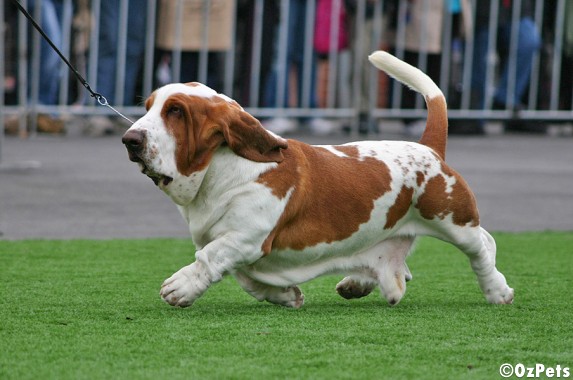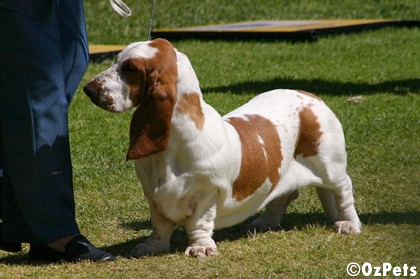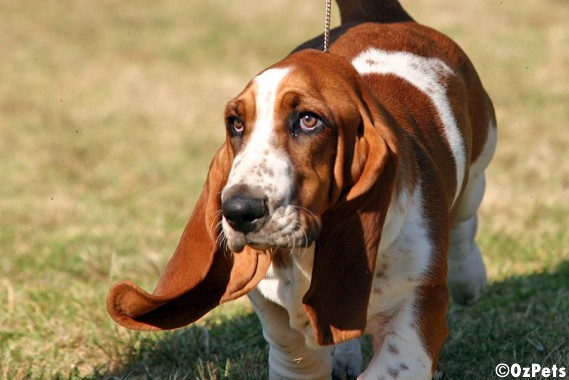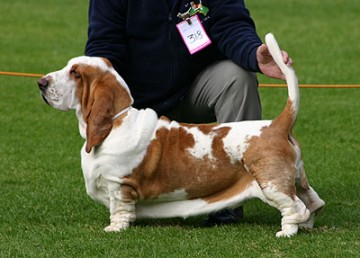
The Basset Hound
 Bassets are large, short, solid and long, with curved sabre tails held high over their long backs. An adult dog weighs between 20 and 35 kilograms. This breed, relative to its size, is heavier-boned than any other. The Basset Hound was bred to hunt, with a keen nose and short stature suited to small-game hunting on foot.
Bassets are large, short, solid and long, with curved sabre tails held high over their long backs. An adult dog weighs between 20 and 35 kilograms. This breed, relative to its size, is heavier-boned than any other. The Basset Hound was bred to hunt, with a keen nose and short stature suited to small-game hunting on foot.
The Basset Hound is a friendly, outgoing, and playful dog, tolerant of children and other pets. They are extremely vocal and famously devoted to tracking. They are also widely known for being stubborn. Prospective owners must be prepared to handle Bassets firmly and patiently. They make excellent family pets especially as they adore the attention of children. It should be noted that like other breeds, Basset Hounds take eighteen months to three years to fully mature. During this juvenile stage they are full of energy and tend to get up to mischief? You can be sure though that with firm and consistent discipline your puppy will make a well mannered, loved and enjoyed member of the family.  This Basset, like its ancestor the Bloodhound, has a hanging skin structure, which causes the face to tend to have a sad look; this, for many people, adds to the breed's charm. The dewlap, seen as the loose, elastic skin around the neck, and the trailing ears help trap the scent of what they are tracking. Its neck is wider than its head. This, combined with the loose skin around its face and neck means that flat collars can easily be pulled off. The looseness of the skin results in the Basset's characteristic facial wrinkles. They drool a lot due to their loose flews. The Basset's skull is characterised by its large long nose, which accounts for it's high sense of smell.
This Basset, like its ancestor the Bloodhound, has a hanging skin structure, which causes the face to tend to have a sad look; this, for many people, adds to the breed's charm. The dewlap, seen as the loose, elastic skin around the neck, and the trailing ears help trap the scent of what they are tracking. Its neck is wider than its head. This, combined with the loose skin around its face and neck means that flat collars can easily be pulled off. The looseness of the skin results in the Basset's characteristic facial wrinkles. They drool a lot due to their loose flews. The Basset's skull is characterised by its large long nose, which accounts for it's high sense of smell. Basset Hounds need relatively little grooming but love to be brushed. Toenails should be trimmed regularly. Ears need to be checked for excessive wax and cleaned when necessary. Bassets have a slight drooping of the lower eye. Occasionally dust accumulates there and could irritate the eye. Eyes should be checked regularly and any discharge or eye change should be reported to your veterinarian.
Basset Hounds need relatively little grooming but love to be brushed. Toenails should be trimmed regularly. Ears need to be checked for excessive wax and cleaned when necessary. Bassets have a slight drooping of the lower eye. Occasionally dust accumulates there and could irritate the eye. Eyes should be checked regularly and any discharge or eye change should be reported to your veterinarian.
Bassets love a daily walk on a lead or a romp in the park but they should be under supervision at all times. At home they should have room to play and gain plenty of natural exercise. Puppies can be overtired by too much exercise so the amount they are walked should be gradually increased as they grow older. Puppies should be discouraged from over rough play and should never be allowed to run down stairs or jump from heights. With older dogs continual exercise on grass tends to weaken their feet so exercise on oil bitumen roads and/or footpaths should be given. The Basset's short legs are due to a form of dwarfism. Their short stature can be deceiving; Bassets are surprisingly long and can reach things on table tops that other dogs of similar heights cannot. Because Bassets are so heavy and have such short legs, they are not able to hold themselves above water for very long when swimming, and should always be closely supervised in the water.
The Basset's short legs are due to a form of dwarfism. Their short stature can be deceiving; Bassets are surprisingly long and can reach things on table tops that other dogs of similar heights cannot. Because Bassets are so heavy and have such short legs, they are not able to hold themselves above water for very long when swimming, and should always be closely supervised in the water.